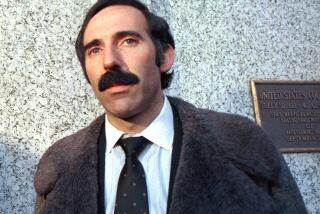Bilzerian Resigns as Chief of Singer After SEC Charges Fraud in Takeover
- Share via
NEW YORK — Paul A. Bilzerian resigned Thursday as chairman and chief executive of Singer Co., hours after the Securities and Exchange Commission filed civil securities fraud charges against him and shopping center magnate Edward J. DeBartolo Sr.
The resignation came amid mounting legal troubles for Singer and for Bilzerian, who was convicted June 9 on criminal securities and tax fraud charges. The SEC charges filed Thursday included the first public accusation that Bilzerian committed fraud in his $1.06-billion takeover of Singer in February, 1988.
The company, now based in Tampa, Fla., offered no explanation for Bilzerian’s resignation. In a statement, Singer said Bilzerian also resigned from the company’s three-member board of directors. No successor was named for Bilzerian, but Singer said Joseph J. Campanella will continue as president and chief operating officer.
In addition to Bilzerian’s personal legal problems, the company faces a host of lawsuits with potential liability totaling more than $600 million. Some of the suits relate to Bilzerian’s sale of much of the company’s assets.
The firm also reportedly faces a Saturday deadline for repayment of $81 million in debt to Texas oilman T. Boone Pickens Jr.’s Mesa Limited Partners, which Bilzerian used to help finance the acquisition.
Denies Rumors
If the debt isn’t repaid on time, Mesa reportedly has the right to seize control of Singer’s board. It wasn’t clear Thursday if the debt would be repaid on time. But the company said a federal judge in Connecticut on Thursday denied a motion by former Singer employees to attach the company’s remaining assets in a lawsuit over pension and health benefits.
Seeking to quash rumors, the company denied that its assets would be sold. The statement said “the company is not being liquidated and . . . there has never been any plan to liquidate it.”
Bilzerian himself didn’t respond to a telephone message left at Singer on Thursday. His lawyer, Arthur Mathews, said he couldn’t comment because he “wasn’t involved” in Bilzerian’s decision to resign. Bilzerian, who has said he plans to appeal the criminal conviction, faces up to 45 years in prison when he is sentenced in August.
Bilzerian, 39, acquired Singer, the former sewing machine concern that had become a major defense contractor, after failed raids on several other companies. In a 75-page lawsuit filed Thursday in U.S. District Court in Washington, the SEC accused Bilzerian of having lied to the SEC about his source of funds for a series of takeover attempts from 1985-88. He also allegedly failed to disclose in filings that he had amassed big blocks of stock in several of the companies in advance of his takeover offers. The SEC requires investors holding more than 5% of a company’s stock to file a disclosure statement.
DeBartolo, who provided some of Bilzerian’s financial backing, was accused of aiding and abetting the false filings. DeBartolo is the head of a closely held concern based in Youngstown, Ohio, which owns shopping malls throughout the United States as well as other interests that include the San Fancisco 49ers football team and the Pittsburgh Penguins hockey team.
DeBartolo, 79, immediately agreed to settle the SEC lawsuit without admitting or denying guilt. He will pay the government $2.7 million, which the SEC said represents the profits he made on his investments in the Bilzerian corporate raids. No criminal charges have been filed against DeBartolo.
Some of Bilzerian’s personal legal problems stem from accusations that in attempting to become a corporate raider in the mid-1980s, he exagerated his own personal resources. He allegedly failed to disclose that much of the funding for his takeover attempts came from other investors.
The nine criminal charges he was convicted of relate to filing false statements and evading taxes in his failed efforts to acquire Cluett Peabody & Co., H. H. Robertson Co., Hammermill Paper Co. and Armco Inc. Although the attempts were unsuccessful, Bilzerian is said to have made about $60 million in profits from his investments in the companies.
The civil SEC charges filed Thursday in Washington closely parallel the criminal charges, but also include allegations relating to three additional companies. They are Singer, Pay ‘N Pak Stores Inc. and Fortune Financial Group. The SEC is seeking $31.2 million in financial penalties from Bilzerian and an injunction stopping him from further violations of securities laws.
Mathews, Bilzerian’s lawyer, said he hadn’t yet received a copy of the SEC’s 75-page lawsuit. But he said Bilzerian will contest the charges. The lawyer said he had expected the SEC charges, but was surprised that they included allegations relating to the three additional companies.
The charges involving Singer include claims that Bilzerian lied in an SEC filing made on Oct. 29, 1987. He stated that 2.1 million shares of Singer common stock he had acquired up to then were financed through personal loans and by a partnership he controlled. The SEC charged that much of the money actually came from other investors.
The suit also charges that Bilzerian misrepresented his source of funds for a big block of Pay ‘N Pack stock he acquired in 1987. The SEC accused Bilzerian of failing to file a disclosure statement within the required time limit after he had amassed more than 5% of the stock in Fortune Financial.
Other defendants in the SEC lawsuit included William D. Moses and Richard S. Sokolov, both employees of the DeBartolo concern, and David A. Tallant, a lawyer in Carmichael, Calif. Like DeBartolo, Moses and Sokolov agreed to settle the suit without admitting or denying guilt. Moses had testified against Bilzerian in the criminal trial, and provided the government with tapes of telephone conversations he had had with Bilzerian.
More to Read
The biggest entertainment stories
Get our big stories about Hollywood, film, television, music, arts, culture and more right in your inbox as soon as they publish.
You may occasionally receive promotional content from the Los Angeles Times.










